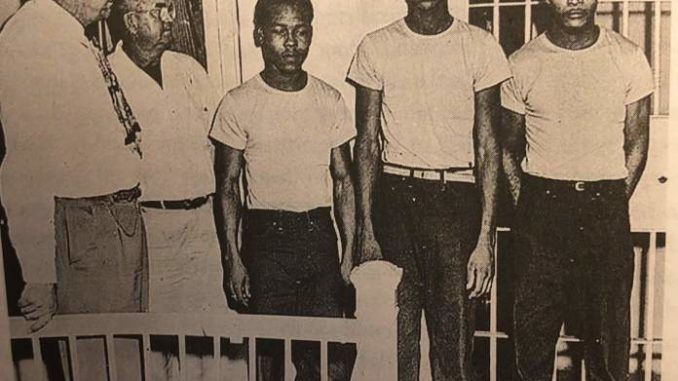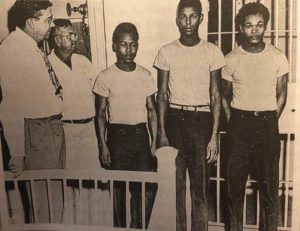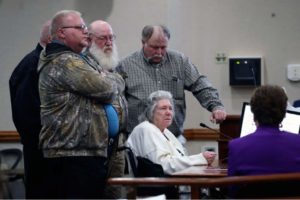

One of the first act of Florida’s new Governor Ron DeSantis and the state’s three-member Cabinet was to grant posthumous pardons to four Black men accused of raping a white woman in 1949 in Lake County, Florida.The Groveland Four, as the case was known, was a case long-known for the racial injustice it bore upon the four men it affected: Samuel Shepherd, Walter Irvin, Charles Greenlee, and Ernest Thomas.
“I don’t know that there’s any way you can look at this case and think that those ideals of justice were satisfied,” Gov. DeSantis said. “Indeed, they were perverted, time and time again.”
The 17 year old woman who accused them rape did not retract her statement. Norma Padgett had claimed that she was abducted and raped by four Black men after her car broke down.
There is uncertainty about whether Padgett was raped. The prosecution did not question Dr. Geoffrey, the physician who examined her, on the stand. Judge Truman Futch did not permit the defense to call the doctor as a witness. According to his records, Geoffrey could not tell whether she had been raped. He found no evidence of tears or wounds in the vagina other than the lacerations mentioned above. Laboratory analysis of a vaginal smear revealed no spermatozoa present in the vagina, nor any organisms resembling gonococci, which could have been other evidence of sex. There were no other gross signs of bruises, breaks in the skin or other signs of violence.

Shepherd and Irvin said that they had been together drinking in Eatonville, Florida, the night of the alleged attack. Greenlee said he was nowhere near the other defendants on that night and that he had never met Shepherd and Irvin before.
Greenlee, Irvin, and Shepherd were charged, imprisoned and beaten that night in the basement of a county jail. Thomas tried to escape, but was hunted down “by an armed, deputized posse of approximately 1,000 men with bloodhounds,“ according to a detailed apology offered to the men by state legislators in 2017. He was shot dead before being either charged or tried.
Greenlee was sentenced to life in prison by an all-white jury. Irvin and Shepherd, both World War II veterans, were sentenced to death.
Their capital case was appealed to the U.S. Supreme Court, which ordered a retrial. But before the second trial could begin, Lake County, Fla., Sheriff Willis McCall drove the two handcuffed men into the countryside and shot them. Irvin was wounded, Shepherd died on the spot.
McCall claimed self-defense.
Irvin — who was represented by future U.S. Supreme Court Justice Thurgood Marshall — was later sentenced to death again. That sentence was later commuted to life in prison. He died in 1969 after being released on parole for just one year.
Thurgood Marshall, the lead lawyer of the NAACP, pressed the Justice Department and the FBI to initiate a civil rights and domestic violence investigation into the beatings. Marshall convinced the Justice Department that the beatings violated the men’s rights, and the FBI dispatched agents to investigate. The FBI later concluded that Lake County deputies James Yates and Leroy Campbell had violated the Groveland men’s civil rights and urged U.S. Attorney Herbert Phillips of Florida to prosecute, but a grand jury did not return indictments of the deputies.[15]
The prosecution never introduced the coerced confessions as evidence into the trial.
Greenlee was released from prison in 1962 and lived until he was 78 in 2012.
In 2017, the state of Florida formally apologized to the families of the Groveland Four. That helped to pave the way for the pardon under Mr. DeSantis, who was inaugurated earlier that week.
“Seventy years is a long time,” DeSantis said before taking office. “And that’s the amount of time four young men have been wrongly written into Florida history for crimes they did not commit and punishments they did not deserve.”

Be the first to comment